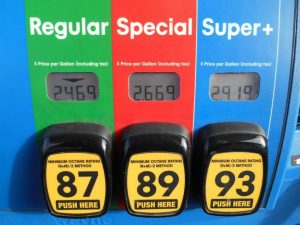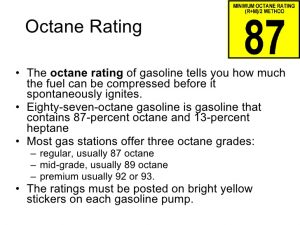Here’s the latest reader question, along with my reply!
Budd asks: For the past two years I have been using regular (87? octane) in my 2017 Jetta TSI. We have one more year on the lease and are now debating what to do when the lease is over, including whether premium (91? octane) is “better” for the engine. I have never heard any engine sounds that would indicate the engine is complaining about the lower fuel, and I think I have read somewhere that higher octane fuel can harm an engine designed for regular. We should end up with around 8,000 miles on the car, so perhaps keeping it is an option. Thanks for all of your writing!
My reply: It’s more a question of whether premium (i.e., high-octane) fuel is necessary to get the best performance and mileage out of your car’s engine.
VW – like other car manufacturers – specifies a particular octane rating for a given engine; this info is usually printed on a sticker on the inside of the fuel door or will be in the owner’s manual (look in the index under fuel requirements).
If your engine was designed to deliver peak performance (and fuel economy) on 87 octane regular, then that is the grade of fuel you should use to get the best performance and economy.
Higher octane fuel is not better for an engine that wasn’t designed to take advantage of the higher octane rating. The extra expense of the high-octane premium is not warranted.
If, on the other hand, the engine in your car was designed to deliver best power/efficiency on high-octane premium, then that is the fuel you should use and money well-spent, assuming you want the best performance (and economy) your car’s engine is mechanically capable of delivering.
You can still use regular/mid-grade fuel (lower octane) without worrying about harming the engine; all modern cars have computer-controlled engines that can self-adjust such things as ignition timing and (if applicable) turbo boost to accommodate fuels of varying octane.
It is not like the Old Days, when feeding low-octane fuel to a high-compression/turbocharged or supercharged engine would result in what was called spark knock or pre-ignition – so called because lower-octane fuel would spontaneously and prematurely combust within the engine’s cylinders; the uncontrolled explosion would try to force the piston down when it was still coming up.
That isn’t an issue with modern cars.
However, use of lower-than-specified octane in an engine designed to burn premium will usually result in a noticeable reduction in engine power/performance – as well as a dip in mileage, because the engine isn’t running at peak efficiency.
So, it’s worth the extra expense of high-octane premium fuel, not just to get the peak power/performance, but also the best mileage your vehicle is capable of delivering.
. . .
Got a question about cars – or anything else? Click on the “ask Eric” link and send ’em in!
If you like what you’ve found here please consider supporting EPautos.
We depend on you to keep the wheels turning!
Our donate button is here.
If you prefer not to use PayPal, our mailing address is:
EPautos
721 Hummingbird Lane SE
Copper Hill, VA 24079
PS: Get an EPautos magnet (pictured below) in return for a $20 or more one-time donation or a $5 or more monthly recurring donation. (Please be sure to tell us you want a sticker – and also, provide an address, so we know where to mail the thing!)
My latest eBook is also available for your favorite price – free! Click here. 











